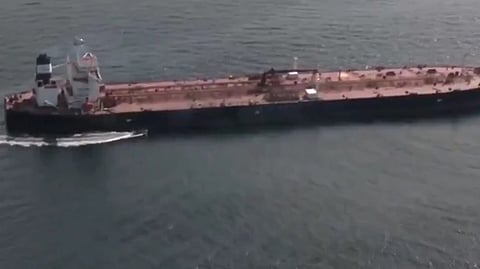

France's detention of a tanker suspected of operating for Russia's "shadow fleet" is part of a new European strategy to block revenue funding Moscow's war effort in Ukraine, President Emmanuel Macron said on Thursday.
Macron added that it was yet to be determined whether the vessel had been involved in drone incursions in Denmark last week, which shut Danish airports close to the route the ship was sailing from the Baltic to the North Sea.
French Navy commandos raided the Boracay on Saturday off western France. The vessel was already under EU and British sanctions for suspected participation in Russian oil exports.
According to data from MarineTraffic, the ship passed around 50 nautical miles (90 kilometres) south of Copenhagen when drone activity forced the closure of the Danish capital’s airport last week, and was later off Denmark's western coast when drones were reported flying near several airports in that area.
Denmark has called the drone incursions a hybrid attack and suggested Russia may have been responsible, although it has not definitively ascribed blame. Moscow has denied involvement.
Macron, speaking at an EU event in Copenhagen, said he could not rule out a connection between the vessel and the drone incursions, but so far lacked proof. The tanker raid was part of a wider plan to take tougher actions to limit Russia's oil sales and press for an end to the war in Ukraine, he said.
“We want to increase pressure on Russia to convince it to return to the negotiating table,” he said. “We have now decided to take a step further by moving towards a policy of obstruction when we have suspicious ships in our waters that are involved in this trafficking.”
He said NATO members would in coming days coalesce around more concrete measures to step up their campaign against Russia's "shadow fleet", which he estimated at 800–1,000 vessels.
Russia is accused of using a collection of ageing tankers to circumvent sanctions and keep its oil flowing to remaining customers.
The Kremlin said on Thursday that France's detention of the vessel was "hysteria" that could create problems for global energy transportation routes.
“What if France creates enormous problems for all the routes of international energy sources? What is going to happen?” Kremlin spokesman Dmitry Peskov told reporters. “I think it's all part of this hysteria I mentioned before.”
The prosecutor's office in the French port of Brest is handling an investigation into the vessel after its crew provided what French authorities described as inconsistent information about its nationality.
The ship’s captain, a Chinese national, is being prosecuted for failure to comply, and his hearing is scheduled for February 23, Brest Prosecutor Stephane Kellenberger said. Any other investigative angles fall outside the remit of the Brest prosecutor, Kellenberger added.
The Boracay loaded 100,000 tonnes of Urals oil sourced by Russian state company Rosneft from the Russian port of Primorsk, near Finland, on 20 September, according to two traders familiar with the shipping data. The vessel was destined for India’s Vadinar port, home to a refinery owned by India’s Nayara Energy.
Rosneft, Russia’s largest oil firm and a major supplier to China and India, has a 49 per cent stake in Nayara Energy and supplies it with crude. Rosneft did not immediately respond to a request for comment.
(Reporting by Alessandro Parodi and Makini Brice; Additional reporting by Michel Rose and Geert De Clercq; Writing by Gabriel Stargardter; Editing by Richard Lough, Hugh Lawson, Peter Graff)
